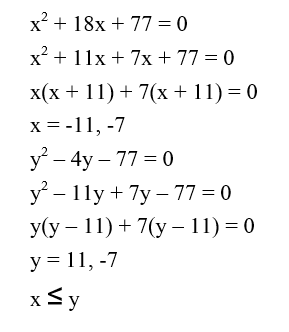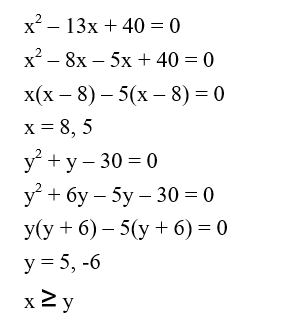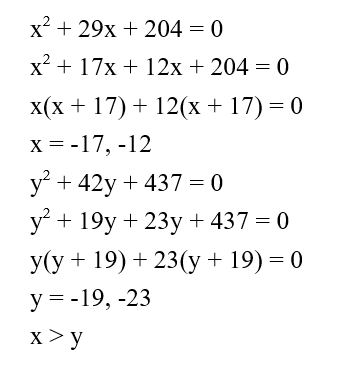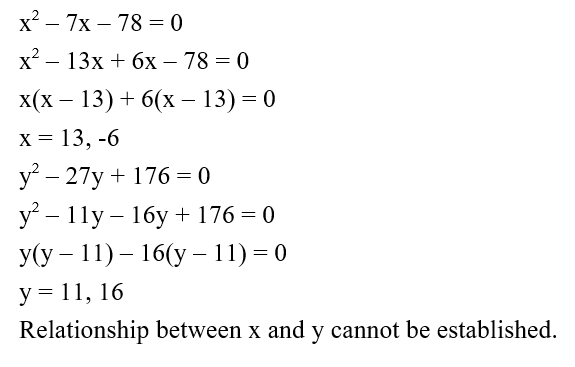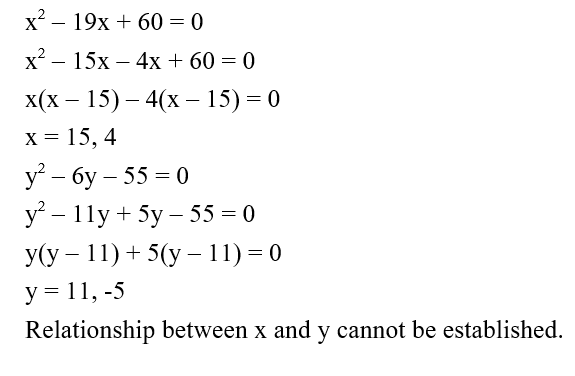Question 1:
The following question contains two equations as I and II. You have to solve both equations and determine the relationship between them and give the answer as, निम्नलिखित प्रश्न में I और II के रूप में दो समीकरण हैं। आपको दोनों समीकरणों को हल करना है और उनके बीच संबंध निर्धारित करना है और उत्तर देना है,
I) x2 + 18x + 77 = 0 II) y2 – 4y – 77 = 0
Question 2:
The following question contains two equations as I and II. You have to solve both equations and determine the relationship between them and give the answer as, निम्नलिखित प्रश्न में I और II के रूप में दो समीकरण हैं। आपको दोनों समीकरणों को हल करना है और उनके बीच संबंध निर्धारित करना है और उत्तर देना है,
I) x2 – 13x + 40 = 0 II) y2 + y – 30 = 0
Question 3:
The following question contains two equations as I and II. You have to solve both equations and determine the relationship between them and give the answer as, निम्नलिखित प्रश्न में I और II के रूप में दो समीकरण हैं। आपको दोनों समीकरणों को हल करना है और उनके बीच संबंध निर्धारित करना है और उत्तर देना है,
I) x2 + 29x + 204 = 0 II) y2 + 42y + 437 = 0
Question 4:
The following question contains two equations as I and II. You have to solve both equations and determine the relationship between them and give the answer as, निम्नलिखित प्रश्न में I और II के रूप में दो समीकरण हैं। आपको दोनों समीकरणों को हल करना है और उनके बीच संबंध निर्धारित करना है और उत्तर देना है,
I) x2 – 7x – 78 = 0 II) y2 – 27y + 176 = 0
Question 5:
The following question contains two equations as I and II. You have to solve both equations and determine the relationship between them and give the answer as, निम्नलिखित प्रश्न में I और II के रूप में दो समीकरण हैं। आपको दोनों समीकरणों को हल करना है और उनके बीच संबंध निर्धारित करना है और उत्तर देना है,
I) x2– 19x + 60 = 0 II) y2– 6y – 55 = 0
Question 6:
In an election, three candidates Kala, Mala and Bala are contested. Kala received 40% of total votes, Mala received 25% of total votes and Bala received 140 votes. What is average number of votes received by Kala and Mala? तीन उम्मीदवारों काला, माला और बाला के बीच एक चुनाव में, काला को कुल मतों का 40%, माला को कुल मतों का 25% और बाला को 140 मत प्राप्त हुए। काला और माला को प्राप्त मतों की औसत संख्या क्या है?
Question 7:
A boat travels 216 km upstream and downstream in 27 hours. If the boat travels 228 km against the stream in 19 hours, then what is the speed of the boat in still water? एक नाव 216 किमी धारा के प्रतिकूल और धारा के अनुकूल 27 घंटे में तय करती है। यदि नाव 19 घंटे में धारा के विपरीत 228 किमी की यात्रा करती है, तो ठहरे (स्थिर) पानी में नाव की गति क्या है?
Question 8:
Surya and Ravi jointly started a business. Surya invested five times as Ravi invested and Ravi’s investment time period is thrice that of Surya. The difference between their profit share is Rs.2800. Then find the profit earned by Surya? सूर्या और रवि ने संयुक्त रूप से एक व्यवसाय शुरू किया। सूर्या ने रवि के निवेश से पांच गुना निवेश किया और रवि ने सूर्या की तुलना में तीन गुना अधिक समय के लिए अपना पैसा निवेश किया। उनके लाभ हिस्से के बीच का अंतर 2800 रुपये है। तो सूर्या द्वारा अर्जित लाभ ज्ञात कीजिये?
Question 9:
Ratio of the present ages of Karthick and Karthika is 3:2 and 6 years ago, the ratio of their ages was 5:3. If the average age of Kamal, Karthick and Karthika is 27 years, then find the age of Kamal after 4 years? कार्तिक और कार्तिका की वर्तमान आयु का अनुपात 3:2 है और 6 वर्ष पहले उनकी आयु का अनुपात 5:3 था। यदि कमल, कार्तिक और कार्तिका की औसत आयु 27 वर्ष है, तो 4 वर्ष बाद कमल की आयु ज्ञात कीजिए?
Question 10:
A beaker contains 270 liters mixture of diesel and oil in the ratio of 5:4. If x liters of oil is added to the mixture, the ratio of the oil and diesel becomes 7:5, then find the value of x? एक बीकर में 5:4 के अनुपात में 270 लीटर डीजल और तेल है। यदि मिश्रण में x लीटर तेल मिलाया जाता है, तो तेल और डीजल का अनुपात 7:5 हो जाता है, फिर x का मान ज्ञात कीजिए?

